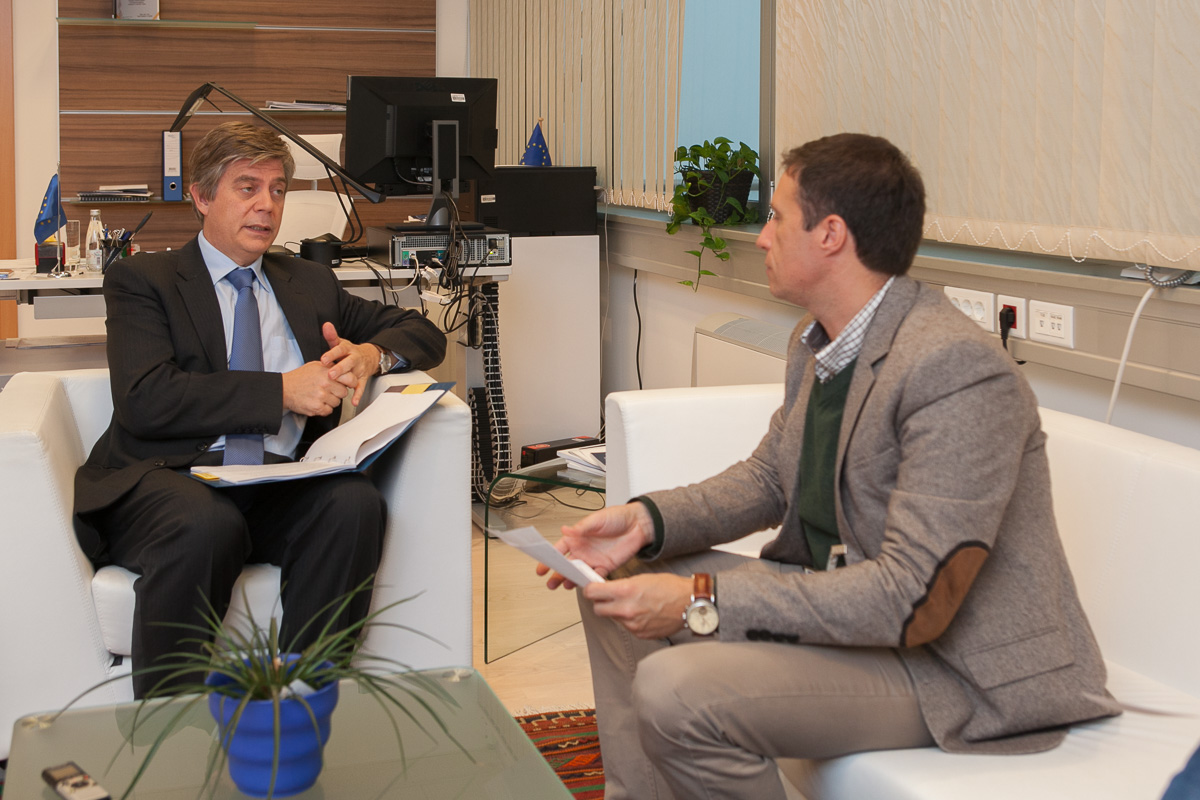This interview was originally published in the daily Vecernji list on 19 October 2015.
It seems that the arrival of Swedish diplomat Lars-Gunnar Wigemark as Head of the Delegation of the European Union and the EU Special Representative in Bosnia and Herzegovina has had a positive effect on the European path our country. Only a few months after his appointment the Stabilisation and Association Agreement with the EU came into effect, the Reform Agenda was adopted and, most importantly, serious implementation of this reform package started. After years of stalemate, Bosnia and Herzegovina is finally moving in the right direction.
How satisfied are you with the implementation of the Reform Agenda at all levels?
I am very satisfied. I think the authorities, both entity and state level, are very serious about this issue. The Reform Agenda is something that they were very much involved, in the development and elaboration, formulation. Of course, their efforts entailed close cooperation with international institutions, the IMF, the EBRD, the World Bank, and the European Union. I think that the authorities at all levels have taken ownership of the Reform Agenda, adopted their action plans which are very detailed. Already a whole series of laws have been initiated, including a Justice Sector Reform Strategy, which was adopted at the level of the Council of Ministers BiH and is important for the overall reform of the justice sector in Bosnia and Herzegovina. The Federation BiH also adopted a new Labor Law, and now the negotiations on the new collective agreements are expected. According to available information, Republika Srpska also has a Draft Law subject to serious consideration, and should be sent to the parliamentary procedure by the end of this year.
Are you concerned about certain dissonant tones that exist between the Council of Ministers – Government of the RS when it comes to implementing the Reform Agenda?
I am not concerned because I would not say that there are some dissonant tones. I was personally present during the discussion when identifying who does what. It is very clear what the responsibility of the state is and what is in competence of Entity governments. The Reform Agenda is neutral in terms of competence and there is nothing controversial. As you enter into these discussions who is responsible for what, it becomes a never ending story, as we have seen in the past 20 years. That is why I said that this Reform Agenda is significantly different from all the other initiatives you had seen earlier. The actors are very clearly defined; it is clear who is doing what in both entities and at the level of the Council of Ministers BiH. All stakeholders have their roles. For example, labor laws are the issue to be resolved exclusively by the entities, and when we talk about taxation, it is an issue that involves the entities and Council of Ministers BiH. In particular when it comes to harmonization. The first revision of the activities on the implementation of the Reform Agenda will be done somewhere towards the end of this year. We hope that a conference will be organizes as an overview of the work done, with the participation of the main actors. Most measures of the Reform Agenda are much more far-reaching than the measures and reforms that have been attempted in previous years.
What should be the priority in the next period of government when it comes to implementation of reforms? What would you find satisfactory by the end of this year?
Labour Law and everything else that is associated with it is very important. From the beginning we had an understanding among all actors, because you have a very rigid labor market in BiH. Employers pay the amount of the contributions almost equal to the amount of salary. Now the payments for the health care system will be reduced, and instead the government proposed higher excise taxes on cigarettes and alcohol. These are some things that employees do not see, but the employer who pays contributions can see this. However, in case of the reduced rate for these payments, it must compensated in some other way. Higher excise duties on certain goods are one of the ways to provide compensation.
You have been advocating to have more focus on judicial reform. What specifically do you expect from the authorities in BiH to do and does it have anything to do with the announcement of the referendum in the RS?
Reforms of the justice sector, as well as socio-economic reforms, do not imply only one question, but a number of related issues. Within the Reform Agenda there is a whole chapter concerning the rule of law and, within that, judicial reform. The Council of Ministers, as well as governments of entities, have all agreed on the Strategy for the Reform of Justice Sector, which is a comprehensive, and in this context we should not only talk about criminal justice, but also of obligations. If you have investors who wish to invest in BiH, they will certainly insist on the existence of contractual security. If they have to pay, to bribe people to get a license, it certainly is not a good situation. Also, local businesses want legal security. I think we all know that there is a complex system of connections between political parties, companies, etc., and the ultimate goal is to break those links. It will take time, but that is our goal, and I have no problem to say this. The judiciary is very important, it must be independent and it is a fundamental principle which must be respected at all levels. As you know, we have a Structured Dialogue on Judicial Reform. We engage with the Ministries of Justice on three levels and the Judicial Commission of Brčko District. We are considering the way to improve the current system, to make it clearer with regard to the jurisdiction , for example of the Court BiH. Nobody is proposing to take away anyone’s jurisdiction or abolish institutions. Nobody is challenging their existence or jurisdiction. The only question is how to explain their roles. All questions, no matter how technical or legal, have their political weight and therefore require the involvement of the relevant ministries.
Still awaiting adoption of coordination mechanism. How likely is it that BiH will meet the outlined goal, and that is the submission of a credible application for EU membership by the end of the year?
The mechanism of coordination is one of the three or four key requirements or objectives, underlined by the EU in its new approach to BiH. Definitely there has been progress in the implementation of the Reform Agenda and it is important to maintain this momentum. Implementation of the entire Reform Agenda will probably take three or four years. The intention is also to reach an agreement where you have multiple roles, from cantonal to state level. All this is reflected in the coordination mechanism, and therefore it is difficult to find a solution that is acceptable to all. How to find a working principle which will protect the interests of all. Each member state has its model of coordination and here we are discussing different models of coordination. I would say that the starting point is something that has been suggested in the past and now it should be modified in the context of relations with the EU and the Stabilization and Association Agreement. Of course, the trouble is always in the details, and now, it seems to me, there is political will and interest to agree coordination mechanism and I believe in an agreement by the end of the year. There is also a third, rather technical issue, which is an adaptation of the SAA in the trade part, especially with the Republic of Croatia. It must be resolved. If you have a Reform Agenda, progress in the agreement on the coordination mechanism, the adjustment of the SAA is the third precondition for a credible application for EU membership.
Do you expect that BiH will meet these demands by Croatia for adjustment of the SAA in the part concerning trade and what might be the consequences in the absence of agreement?
I would like to clear some misunderstandings that Croatia is the one that insists on the adaptation of the SAA. The Agreement exists and it is the same for all countries. The same happened when Slovenia joined the EU. Then we had to adapt the trade between Slovenia and Bosnia and Herzegovina. It was the same with the trade of Poland, Baltic and some other countries with Russia. The EU has a model of how to approach to this issue and it is a model that we always apply and that is prescribed. We cannot move the framework. It is not just related to Croatia, because the model has been around before. It concerns the whole EU, but Croatia is the focus probably because BiH has the most developed trade and longest international border with it. I would say that within this framework there are opportunities to discuss individual products, but we need to dispel the myth that this would destroy agriculture of BiH. It is important to know that the EU will not change the framework for addressing this issue, which is technical in nature. If we do not find a solution by the end of the year, BiH will lose some of the preferential trade arrangements. It is necessary to make a decision, and it can only be made by your authorities, your political leaders. I think that many of them only recently became aware that this is an issue that must be carefully considered. From our side there is a good will and we do not want to do anything that would lead to destroying the economy of Bosnia and Herzegovina. But the ball is on BiH side of the field and you need to play as you have played in the qualifiers for the European Championship in football and everything will be fine. Just, you know that the goal cannot be moved.
To what extent refugee crisis and other global problems can affect the ability and willingness of the EU to continue the process of enlargement to the Western Balkans, including Bosnia and Herzegovina?
First of all, the refugee crisis is a very serious issue, not only for the EU but for the entire international community. What happened in recent months is a good lesson to what is and what is not the EU. Our coordination mechanism on immigration has not worked in the past and it takes time to improve our work. This is already done. It shows what EU membership means. This includes the renunciation of sovereignty to the opening of borders, and if re-established boundaries, the mechanisms of the EU can not function as they should, and thus weakens the EU.
BiH must also realize that if it wants to become an EU member, it has to give up part of their sovereignty, combine it with other members. But then its voice in the world is much stronger because it is presented through a greater association such as the EU. You need to give up on something to get something else in return. That is the way things work.




